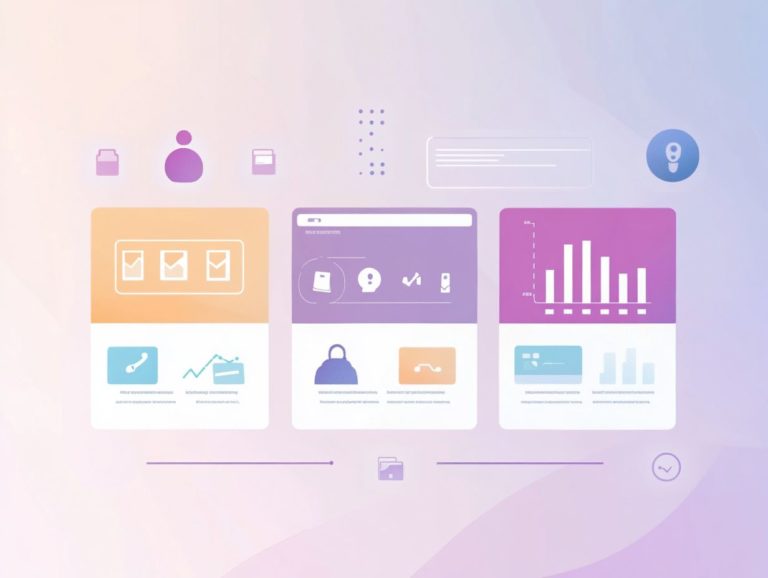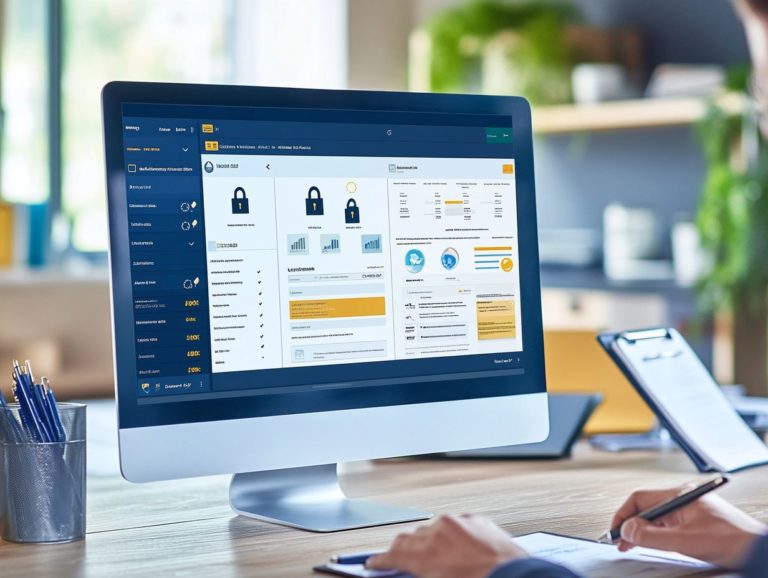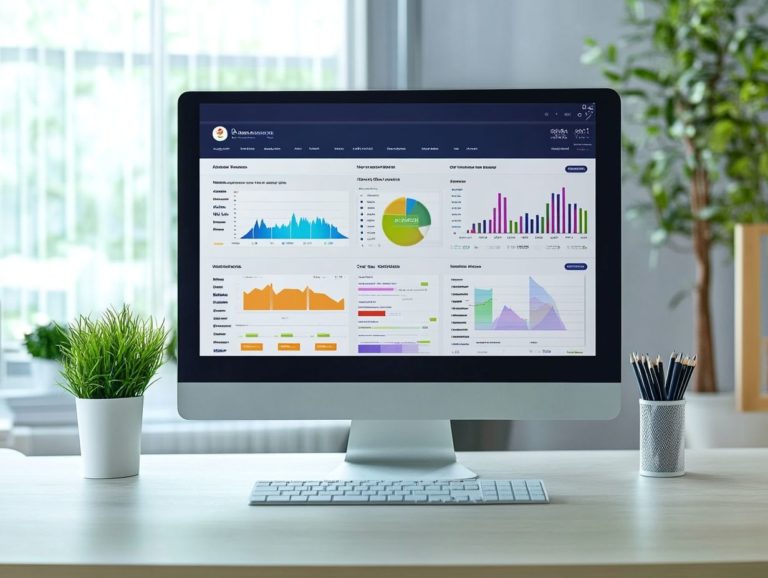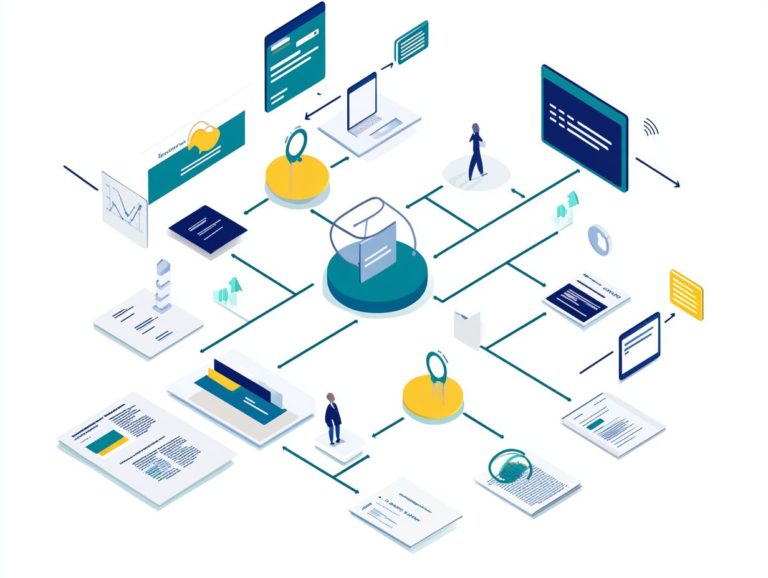How to Conduct CRM Software Training?
In today’s fast-paced business landscape, learning Customer Relationship Management (CRM) software is essential for elevating efficiency and driving success.
This guide lays out the fundamentals of CRM software training. It starts with an understanding of its purpose, moves on to identifying training needs, designs effective programs, and executes successful sessions.
Explore strategies to evaluate outcomes and maintain ongoing proficiency. Whether you re a manager or a team member, get ready to unlock the true potential of CRM tools!
Contents
- Key Takeaways:
- Understanding CRM Software Training
- Benefits of CRM Software Training
- Planning for CRM Software Training
- Designing a CRM Software Training Program
- Implementing CRM Software Training
- Evaluating the Effectiveness of CRM Software Training
- Continuing Training and Development for CRM Software
- Frequently Asked Questions
- What is CRM software training?
- Why is CRM software training important?
- How should I prepare for conducting CRM software training?
- What are some effective methods for conducting CRM software training?
- How long should CRM software training sessions be?
- How can I ensure that employees are retaining the information from CRM software training?
Key Takeaways:

- Proper planning is key to successful CRM training.
- Designing comprehensive programs boosts efficiency.
- Ongoing training is essential for employee proficiency.
Understanding CRM Software Training
Understanding how to implement CRM software successfully is essential for your business if you want to elevate your customer relationship management game.
Equipping your employees with the right skills and knowledge to effectively utilize customer relationship management software platforms like Salesforce, HubSpot, and Microsoft Dynamics 365 can make all the difference.
Proper training boosts engagement and empowers your marketing, sales, and support teams to fully leverage CRM tools. This drives productivity and efficiency, leading to improved customer interactions and satisfaction.
As you explore this topic further, you ll uncover the multifaceted benefits of CRM training, including its critical role in onboarding new employees and facilitating ongoing professional development.
What is CRM Software Training?
CRM Software Training encompasses structured learning initiatives designed to equip you with the essential knowledge and skills needed to effectively utilize customer relationship management software applications in your daily operations, including how to train your team on CRM best practices.
These programs typically kick off with onboarding sessions tailored for new hires, giving foundational insights and hands-on experience to navigate the software with proficiency. Embracing continuous learning is vital to keep pace with updates and evolving features.
Ongoing workshops, webinars, and access to online resources will help you stay sharp and leverage best practices for heightened productivity.
Many organizations encourage employees to participate in certification programs, which not only validate skills but also enhance confidence and foster professional growth. This investment translates into improved CRM usage that benefits the entire organization.
Benefits of CRM Software Training
The benefits of CRM software training are extensive, offering everything from heightened operational efficiency to boosted productivity across your teams. All of this culminates in exceptional customer service and satisfaction.
When you invest in comprehensive training programs for your employees, you can expect notable enhancements in engagement strategies, streamlined processes, and effective use of customer data, allowing you to make well-informed business decisions.
This section will explore the myriad advantages, showcasing how effective training can revolutionize your CRM practices and propel your business growth.
Improving Efficiency and Productivity
Improving efficiency and productivity through CRM software training is essential for organizations aiming to maximize their return on investment in customer relationship management tools.
When you equip your employees with a thorough understanding of automation features, you enable them to streamline daily operations and reduce manual tasks.
For instance, training your staff to leverage automated email campaigns or lead scoring allows them to shift their focus from tedious processes to building meaningful relationships.
This approach facilitates quicker follow-ups with potential clients and enhances the accuracy of your sales forecasts significantly. Performance metrics like reduced response times and increased conversion rates clearly demonstrate the effectiveness of CRM training, turning your training investments into tangible productivity gains.
Planning for CRM Software Training
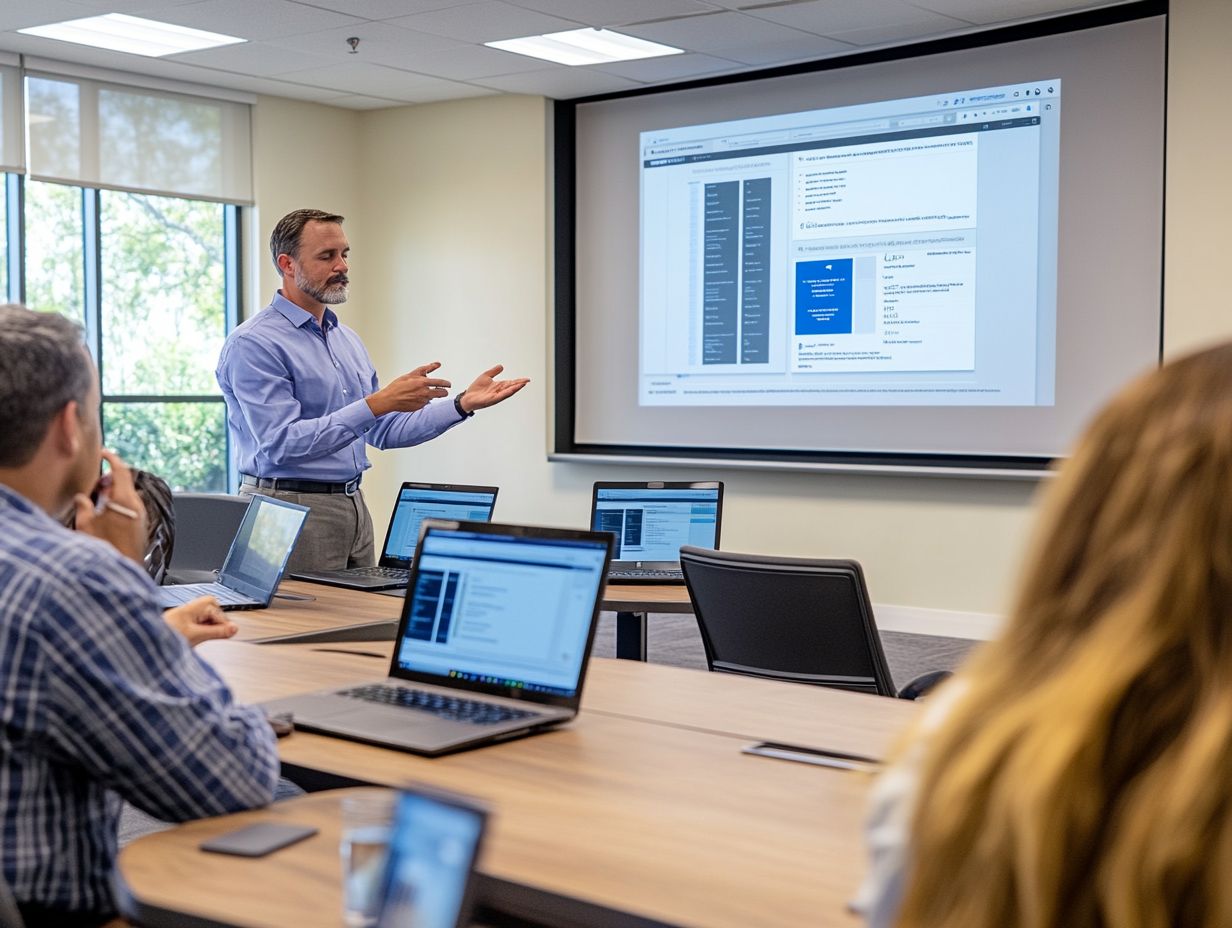
When you plan for CRM software training, it’s essential to conduct a careful assessment of your training needs and objectives. For guidance on this process, consider how to develop a CRM training plan. Careful planning helps your employees make the most of the courses and resources available.
By aligning your training programs with your organizational goals, you can effectively implement strategies that tackle the unique challenges your teams face. This will also bolster your Customer Relationship Management capabilities.
This section will delve into the critical steps necessary for planning effective CRM training that addresses both employee and business needs.
Identifying Training Needs and Objectives
Identifying your training needs and objectives is the essential first step in crafting a successful CRM Software Training program. This ensures that your employees skills align with your organizational goals and effective methods.
To conduct an effective training needs analysis, consider employing methods like employee surveys and direct feedback. These approaches can provide valuable insights into current skill gaps.
Engaging your employees in discussions about their experiences and challenges with the CRM system will help you pinpoint specific areas that need improvement.
Establishing measurable objectives for the training clarifies expectations and guides your overall strategy. This allows for meaningful assessments of progress and effectiveness after the training concludes.
This structured approach makes sure your training stays relevant and effective, ultimately boosting productivity and contributing to your organization s success.
Designing a CRM Software Training Program
When you set out to design a CRM Software Training Program, thoughtfully consider a range of strategies and resources. This will accommodate different learning styles and ensure that you cover all critical aspects of how to train employees on new CRM software and customer relationship management tools.
Providing a rich and effective learning experience is key to the success of your program.
Key Components and Strategies
Key components and strategies of effective CRM training programs encompass a blend of theoretical knowledge, hands-on training, and ongoing support. For more insights on this, consider exploring how to implement CRM software successfully. All of these are designed to optimize user experience and enhance employee engagement.
To craft a truly successful training program, incorporate interactive sessions that promote collaboration and discussion among participants. These engaging sessions help demystify complex concepts and improve real-world application.
Continuous support through mentorship and accessible resources like online tutorials and FAQs builds confidence in navigating the CRM system with ease.
Engagement strategies like gamification and incentive programs can significantly boost motivation. This creates a sense of competition and accomplishment, keeping your team actively involved in the learning process while solidifying their knowledge and skills.
Implementing CRM Software Training
Implementing CRM Software Training is your chance to execute the meticulously designed program. Ensure all employees can engage with the material and apply their newfound knowledge in real-world scenarios by following a guide on how to train employees on CRM software.
This process requires clear communication, strategic use of resources, and collaboration among team members. Together, you can cultivate an environment that promotes learning and growth.
In this section, you will discover essential tips for conducting successful training sessions that enhance retention and practical application of CRM skills.
Tips for Successful Training Sessions
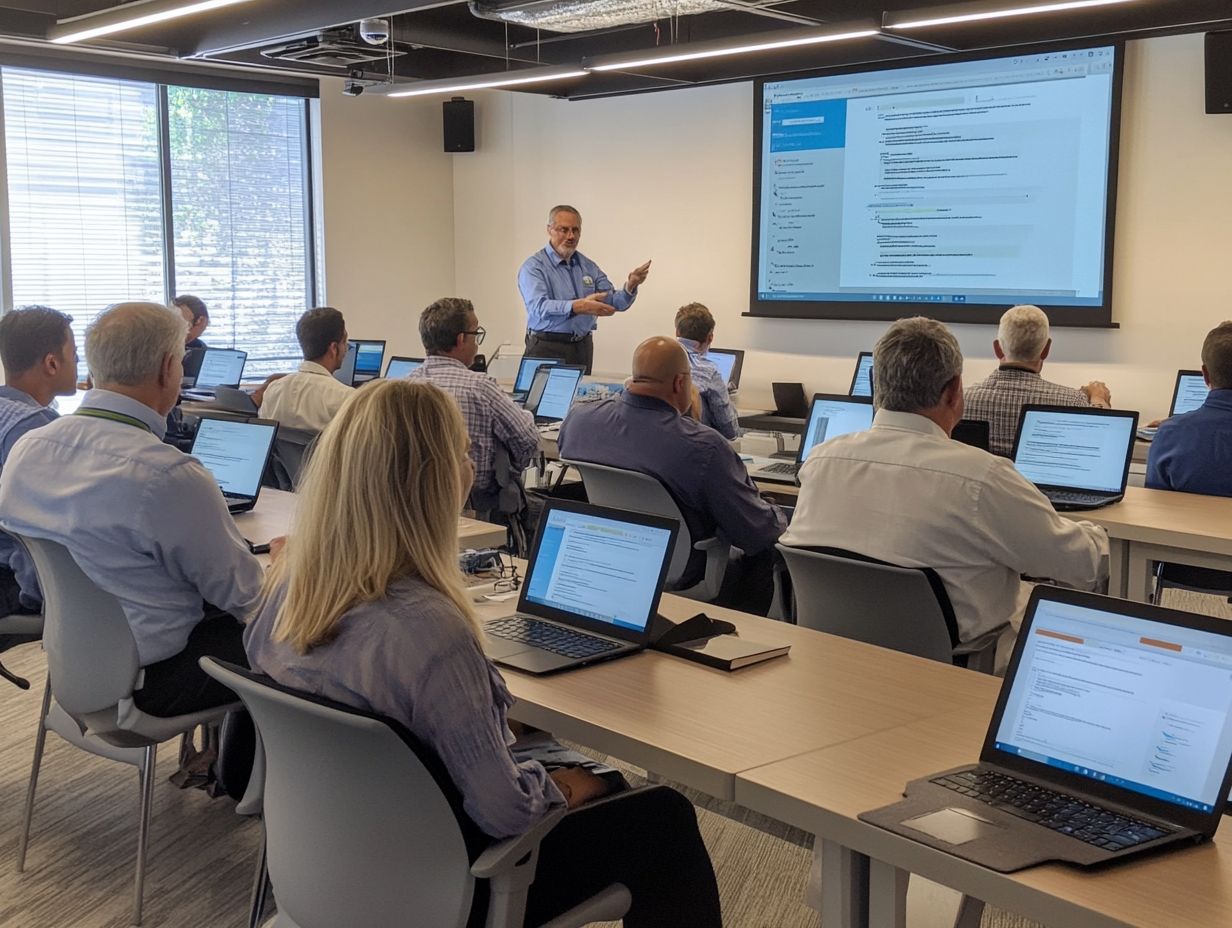
To ensure your CRM software training sessions are a resounding success, it’s essential to apply tips for successful user training in CRM that elevate engagement, retention, and the practical application of the content.
This approach captivates your audience and cultivates a deeper understanding of the material at hand. By incorporating various engagement strategies, you can transform your classroom into an interactive hub where participants feel empowered to voice their questions and share their insights.
Implementing regular feedback mechanisms is crucial. It allows you to adjust your tactics to better meet the needs of the group.
Prioritizing hands-on training guarantees that participants can immediately apply their knowledge, effectively bridging the gap between theory and practice.
Recognizing the diversity in learning styles be it visual, auditory, or kinesthetic enables you to tailor your methods, ensuring that every learner reaps the full benefit of the experience.
Evaluating the Effectiveness of CRM Software Training
Evaluating the effectiveness of CRM Software Training is crucial for understanding how the training influences both employee performance and overarching business goals. To enhance this process, learning how to get started with CRM software can provide valuable insights, allowing you to make informed adjustments to your programs as necessary.
By assessing learning outcomes and collecting feedback, your organization can refine its training processes to align more closely with the ever-changing needs of your teams and customers.
This section will delve into various methods for measuring training effectiveness and highlight the significance of continuous improvement.
Assessing Learning Outcomes and Making Adjustments
Assessing learning outcomes and making necessary adjustments is pivotal to evaluating the effectiveness of your CRM Software Training programs. This aligns the training directly with employee performance and organizational goals.
To accurately measure these outcomes, consider employing a range of metrics, such as pre- and post-training assessments and participant feedback surveys. Utilizing these feedback mechanisms helps you pinpoint knowledge gaps and showcases areas where the program truly shines.
By regularly analyzing this data, you can make timely adjustments to the training content and delivery methods. This creates an environment that is responsive to learners’ needs and elevates the overall quality of future training initiatives.
This iterative process is vital for continuous improvement and maximizes your return on investment in training efforts.
Continuing Training and Development for CRM Software
Continuing training and development in CRM software is essential for maintaining proficiency and encouraging adoption among your employees. This ensures they remain skilled in utilizing evolving CRM tools, enabling them to effectively meet your business objectives.
It s vital for organizations like yours to prioritize continuous learning by providing additional resources, advanced courses, and certification opportunities. This approach keeps your staff informed about the latest CRM strategies and best practices.
In this section, you will discover the significance of ongoing training and how it enhances employee engagement and drives business success.
Ensuring Ongoing Proficiency and Adoption
Ensuring ongoing proficiency and adoption of CRM software among your employees requires a robust framework that promotes continuous learning and provides easy access to training materials and resources.
This framework should incorporate regular refresher courses aimed at reinforcing key concepts and best practices. This keeps knowledge fresh and enhances overall competence.
By providing your team with updated training materials, you empower them to stay informed about the latest features and functionalities. Creating a supportive learning environment encourages individuals to seek help and share knowledge collaboratively.
Integrating feedback mechanisms allows trainers to adapt and tailor resources, ensuring that training evolves alongside changing workplace demands.
This approach fosters a culture of continuous improvement and mastery in using the software, setting your team up for success.
Frequently Asked Questions

What is CRM software training?
CRM stands for Customer Relationship Management. It s a process that teaches employees how to use the software effectively to manage customer interactions and data.
Why is CRM software training important?
CRM software training is vital! It empowers employees to master the features and engage users effectively during training, enhancing customer relationships.
How should I prepare for conducting CRM software training?
Familiarize yourself with the software and its features. Create a training plan and gather necessary materials.
What are some effective methods for conducting CRM software training?
- Hands-on demonstrations
- Interactive activities
- Role-playing scenarios
- Real-life examples to showcase the software’s benefits
How long should CRM software training sessions be?
Sessions typically range from a few hours to a full day, depending on the software’s complexity and user needs.
How can I ensure that employees are retaining the information from CRM software training?
Ensure retention by providing follow-up materials, offering refresher courses, and encouraging questions. Regular use and practice of the software also help with retention.
Ready to boost your CRM skills? Start your training today!

